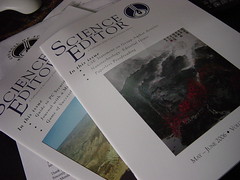Scientists choose citations for “discriminatory” reasons
By Kristopher A. Nelson
in
December 2009
400 words / 2 min.
Tweet
Share
Researchers in Spain recently published an examination of scientific citation practices, and discovered the obvious: scientists don’t use citations purely for altruistic reasons.
Please note that this post is from 2009. Evaluate with care and in light of later events.
Researchers in Spain recently published an examination of scientific citation practices, and discovered the obvious: scientists don’t use citations purely for altruistic reasons.
Citations in science are important as a mechanism to follow the evolution of science and because they are employed as an indicator as to the importance of scientists and institutions: the higher the number of citations of an article, the greater is its recognition. This measure of success implies increased sources of funding, recognition, salaries, etc.
According to Camacho Miñano and Núñez Nickel, the problem arises when the authors, instead of altruistically choosing original sources which facilitate the ideas on which their reasoning is constructed, cite because of spurious interests, attempting to increase the possibility of successfully publishing in the scientific journals.
My immediate reaction is, well, not shock: of course scientists use “spurious” criteria when choosing what and who to cite! Would anyone who has prepared a scientific paper for submission to a peer-reviewed journal actually disagree? Scientific articles need to get published, after all, and scientific ideas need to be supported against dispute and disagreement. This is true even if the science is “good” and “true.”
Still, it’s nice to see research that recognizes this, as too often people view science as so objectively true as to be free of social influences, politics, etc. But realizing that this is not true does not make scientific discoveries or innovations any less true, just adds back in some human complexity and social context.
For more on this concept, try writers like Bruno Latour and works like Science in Action. Not uncontroversial in its whole, but it does do an excellent job opening up discussion on the “non-scientific” aspects of scientific articles. (No one in the law should be surprised by any of this, but attorneys sometimes seem to forget regardless.)
Related articles by Zemanta
- “The granting system turns young scientists into bureaucrats and then betrays them” (zzzoot.blogspot.com)
- Open Science And Closed Science: Aren’t Papers Supposed To Be A Part Of The Conversation? (techdirt.com)
